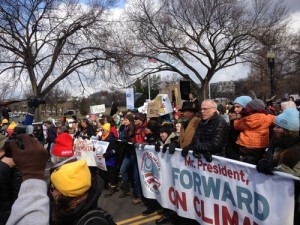What do you call someone who understands that climate change is a threat — perhaps the gravest threat — to our economy, to the environment, to future generations?
If you’re The Washington Post, apparently, you call them a “radical.”

Sunday’s rally for action on climate change brought 35,000 people to Washington, D.C., making it the largest such gathering in U.S. history.
That was the strange and damning headline above an excellent profile by Juliet Eilperin of billionaire Thomas Steyer in Monday’s WaPo:
“Billionaire has unique role in official Washington: climate change radical.”
Never mind that Steyer has been one of the most successful investment managers in the United States. (Farallon Capital Management, the private equity firm he founded in 1986, manages a $20 billion portfolio.)
Never mind that his investments have created thousands of jobs for Americans.
Never mind that he has partnered with such conservative stalwarts such as George Schultz, former Secretary of State under Ronald Reagan.

Thomas Steyer
And never mind that the “radical” position Steyer takes is supported by virtually all climatologists, backed-up by decades of scientific data and analysis.
All this means nothing.
Steyer’s message may be true, but the fossil fuel industry and the politicians it funds don’t like it. So, he’s a radical.
(Interestingly, the only time Eilperin uses the word in her piece is when she writes that “Steyer doesn’t appear radical.”)
On Sunday, Eilperin noted, Steyer spoke briefly at the largest climate rally in U.S. history, where 35,000 people gathered in Washington, D.C.
“For the last 30 years I’ve been a professional investor,” Steyer told the crowd, “and I’ve been looking at billion-dollar investments for decades and I’m here to tell you one thing: The Keystone pipeline is not a good investment.”
The proposed Keystone XL pipeline, which would carry “dilbit” - a particularly noxious form of oil - from Canada to refineries in Texas, has become a symbol of our failed energy practices and a rallying point for those advocating change. (You can read more about the dangers of dilbit here.)
The use of the word “radical” to describe Steyer comes soon after his name was floated as a replacement for out-going Secretary of Energy, Stephen Chu. The timing may be coincidental, but it plays into the hands of those who support the status quo. Chu, a Nobel-prize winning physicist, wasn’t blind to the threat of climate change. But he has not been a sufficiently strong advocate for a sustainable energy policy, either.
It’s the norm for today’s far-right version of the Republican Party to vilify anyone who opposes the will of the fossil fuel industry. If you support solar power, you’re a socialist. (You see benefits in distributed generation solar? That’s an interesting proposition, Comrade.)
There’s nothing new in any of this, of course. The entire story could have been lifted from a play written by Henrik Ibsen in 1882 and titled, fittingly, An Enemy of the People.
Set in a small Norwegian town, the story follows the travails of the local physician who discovers that the village spa has been contaminated by industrial waste. The good Dr. Stockmann imagines that he’ll be hailed as a hero for finding the problem.
But the bath complex anchors the town’s economy. The doctor’s brother Peter, the town mayor, tries to convince Stockmann to cover up the problem. Conduct further studies, the mayor urges, and declare that the water is fine.
“The source is poisoned, man!” counters the outraged doctor. “Are you mad?”
To which the mayor responds, “The man who can throw out such offensive insinuations about his native town must be an enemy to our community.”
Things go downhill quickly for Dr. Stockmann.
The editor of the town newspaper (a leftist!) at first relishes the opportunity to expose corruption among the village leaders. But a visit from the mayor persuades the editor that the cost of fixing the baths would come out of taxpayers’ pockets, leaving them little money for extravagances. Luxuries like, for instance, newspapers. The story is axed.
The “enemy of the people” has his practice ruined, his home destroyed, and his reputation in tatters.
The doctor should have listened to his wife.
After Stockmann’s first conversation with his brother, the doctor tells his wife not to worry. After all, he explains, “I have right on my side.”
“Oh, yes, right — right,” she says, knowingly, and asks, “What is the use of having right on your side if you have not got might?”
In Ibsen’s imagined village, the majority of citizens don’t want to know the truth about the poisoned waters. The situation is different in the United States today. Poll after poll show that the majority of Americans want elected officials to take strong action on climate change. And yet, with neither right not democratic might on their side, our elected officials still refuse to take the kind of action that is commensurate with the challenges we face.
That’s why organizers of Sunday’s event in Washington predict that the rally — while historic — is only the beginning of a movement that is at least as much about democracy and long-term economic prosperity as it is about environmental stewardship.
I know: what radical ideas!


